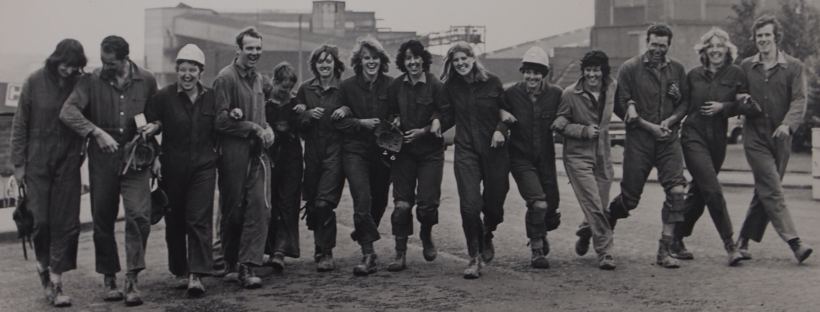Training camps have always presented a difficult challenge: their whole point is to get crews away from the distractions and stresses of everyday life, but by doing just that there’s a risk of people getting both bored and on each other’s nerves. Especially in the dark ages before the internet.
In the run up to the World Rowing Championships in 1977, there was an extra challenge: that final training camp was in the all-too-familiar surroundings of Holme Pierrepont in Nottingham. What was needed was something completely different to keep everyone entertained.
Which is why three of the GB crews went down a pit. As in, an actual working colliery.
The mine in question was Cotgrave Colliery, which is just a few miles from the National Waterports Centre, and the women’s coxed four and coxed quad were taken on a guided tour along with the men’s quad.
Sue Handscomb from the women’s quad remembers:
They kitted us out in full pit gear, right down to a string vest and Y-fronts! We went down an incredibly long way and then crawled for about half a mile along a working face. It was apparently the largest in terms of room, but it was still very claustrophobic. We crawled as it was the only option due to the height of the roof. To our left was a whole load of hydraulic props that moved in unison to allow the mechanical cutter to come by.
The long crawl following Charlie Wiggin’s heels was probably good training for staying focussed: if I’d let my mind wander, I think I would have freaked out and panicked! I discovered that day that I really don’t like enclosed spaces with no immediate exit.
We all showered afterwards and I remember being a bit disappointed that I didn’t look dirty enough but I can assure you that a lot of it got up my nostrils and they had to be included in the clean!
Afterwards we went back to Holme Pierrepont for an outing. I remember our cox saying she was too tired, but we did go out.

A mix of excitement and concern at being issued with safety equipment. (Photo © Advertiser Series, Newark.)
“It was very claustrophobic,” Maggie Phillips from the four remembers, “I could hardly breathe, even when we got back to the surface.” Her crewmate Nicola Boyes was also shocked by the conditions. “It was a disgustingly dirty place. And incredibly cramped. It really brought home what people were doing down a coal mine.” But, she adds, “It was fun because it was interesting. It was a good trip.”

From left: Stephanie Price, Ivor Lloyd, Maureen Thomson (Team Manager), Charlie Wiggin, Liz Norman, Pauline Wright, Beverley Jones, Nicola Boyes, Yvonne Earl, Sue Handscomb, Rosie Clugston, Chris Grimes, Graeme Mulcahy, Maggie Phillips, Malcolm Carmichael. (Photo © Advertiser Series, Newark.)
Having only opened in the early 1960s, Cotgrave Colliery was known as a particularly well-equipped complex, particularly in terms of its shower facilities. It closed in 1994.
Rowing in the swim
Later in the camp the group were taken on another industrial visit, this time to the Speedo factory, which was also near the rowing course.
This may have simply been an opportunity to visit an interesting local facility, although as National Coach Penny Chuter had chosen Adidas as the British Rowing Team’s kit supplier after she’d liked what they did for the Olympic Games in 1976, you do wonder whether it was also a subtle, and unsuccessful, marketing ploy.
Sue remembers getting an excellent goodie bag. “We were all given a swimming costume, a sports bag and a toweling hoodie – which became a favourite for many years after – it was a lovely baby blue!”
Although Speedo still has a strong presence in Nottingham, where its new International Headquarters was opened in 2012, the factory that the GB team visited was closed in 2003 when production of its eponymous trunks and other items was moved to the Far East.
Any current industrial facilities in the Nottingham area considering inviting GB rowers to look round their operations may wish to consider the pattern of closures here before doing so.

I am in your list.
I am Lorraine Prince nee Baker. 1974.
Regards Lorraine.
LikeLike